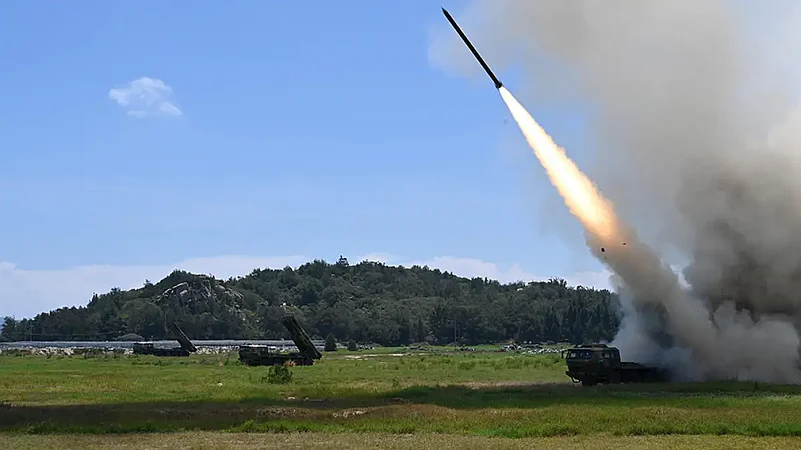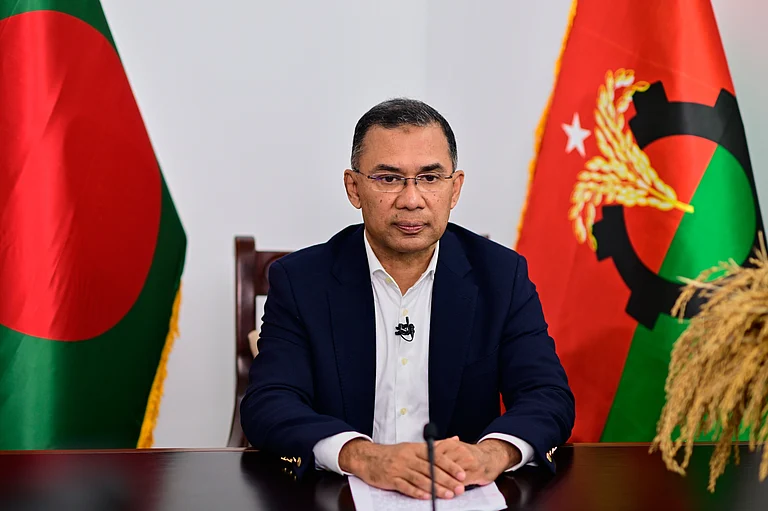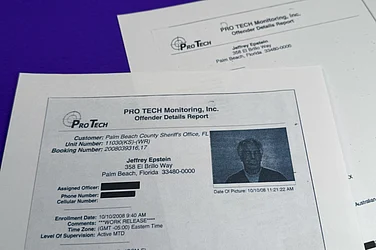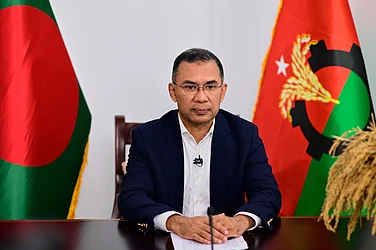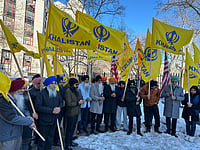A day after US House of Representatives Nancy Pelosi concluded her visit to Taiwan, China launched its biggest-ever military drills around Taiwan, involving a number of fighter planes, warships, and missile launches.
Prior to Pelosi's visit, China had lashed out angrily and had threatened military retaliation.
More than 100 planes, including fighter planes, and 10 warships were involved in the military drills that come amid rising tensions with China, according to Chinese state-run media. Reuters reported Taiwan as saying that 11 Chinese ballistic missiles were fired in nearby waters — the first time since 1996. Besides Taiwan, Japan also said that five Chinese missiles landed in its economic zone's waters.
Here we explain the Chinese military drills, why Pelosi's visit angered China, what's the China-Taiwan dispute, and what's the US policy on Taiwan.
China's biggest-ever drills around Taiwan
China has launched missiles, sent out aircraft, and deployed warships in what's being called as its biggest-ever military exercise near Taiwan. These drills are expected to continue till Sunday. Chinese state-run Xinhua news agency said the country's military "flew more than 100 warplanes including fighters and bombers" and "over 10 destroyers and frigates".
AFP on Friday cited Taiwan's defence ministry as saying that 68 Chinese fighters and 13 warships crossing the "median line" that runs down the Taiwan Strait. The median line is the unofficial but long-held border between Chinese mainland and Taiwan.
China began the aggression even before Pelosi's visit began. Taiwan's defence ministry on Tuesday said that 21 Chinese warplanes entered Taiwan's air defence identification zone.
On Thursday, China fired missiles close to northeastern and southwestern Taiwan. Long-range rockets were also reported falling near Taiwan's islands of Matsu, Wuqiu and Dongyin. These islands are in the Taiwan Strait, but are located closer to the mainland than the main island of Taiwan, according to CNN.
Channel News Asia reported that Chinese missiles flew over Taiwan's capital Taipei "in an unprecedented escalation".
CBS news cited analysts as saying that the Chinese leadership is eager to project strength ahead of a crucial ruling party meeting. Chinese President Xi Jinping is seeking an unprecedented third term as the Chinese leader in the meeting.
"China's announced military exercises represent a clear escalation from the existing baseline of Chinese military activities around Taiwan and from the last Taiwan Strait Crisis in 1995-1996. "Beijing is signaling that it rejects Taiwan's sovereignty," said Amanda Hsiao, senior analyst for China at the International Crisis Group.
The Associated Press also noted that Chinese actions are show that it's not bothered by US actions. It also mentioned that it's another way of Xi to assert himself, who has amassed unprecedented powers in China.
"China has increasingly forcefully declared that Taiwan must be brought under its control by force if necessary and in defiance of Washington and other backers of the island’s democracy...Xi has said Taiwan’s fate cannot remain unsettled indefinitely and US military officials have said China may seek a military solution within the next few years," reported AP.
The significance of Nancy Pelosi's visit
Speaker Nancy Pelosi is the highest-ranking US official to visit China since 1997. Since China considers Taiwan as a breakaway province, it has reacted angrily over the visit.
Pelosi visited Taiwan as part of her Asia tour. Besides Taiwan, she also visited Singapore, Malaysia, South Korea and Japan.
The visit evoked angry reactions from China because it was already going through a tense phase with the United States and the West and it saw Pelosi's visit as a provocation. The timing of the visit before the Communist Party's meeting also meant that Xi had to respond angrily or he and his government risked losing face inside China.
Pelosi's visit also evoked a sharp debate in the United States, with even experts supporting the idea of her visit saying that timing was not correct as any visit before CCP meeting could meant that the Chinese would go for unprecedented escalation which might spiral into a conflict.
Zack Cooper, a researcher at think tank American Enterprise Institute, summarised the debate on Pelosi's visit: "Some believe Pelosi should cancel the visit because the United States should generally avoid actions that worsen tensions with China. Others argue that Pelosi should go because Washington should not back down in anticipation of pressure from Beijing."
Cooper wrote in The Washington Examiner that the timing of the visit was "poor". He highlighted that Pelosi first wanted to visit Taiwan in April and that would have been a good time, but developments including Biden's comments on Taiwan and upcoming CCP meeting could complicate a visit now.
He noted, "The situation would have been somewhat different in April, when Pelosi first planned to visit Taiwan. At that time, Beijing had less time to prepare its response options. The Party Congress was four months further away. Joe Biden had not yet muddied the waters by suggesting the United States has a commitment to defend Taiwan. And Mike Pompeo and Mark Esper had not yet traveled to Taipei and suggested doing away with the 'One China Policy'."
However, once reports of Pelosi's expected visit surfaced, it was very hard for her to not visit Taiwan as that would have appeared as US buckling under Chinese pressure and a loss of face in front of the world. Therefore, going ahead and careful management of the fallout was the only workable option with the US leadership.
What's the Taiwan dispute all about?
The Taiwan dispute is rooted in the very idea of China. The China's —mainland China's— official name is People's Republic of China (PRC) and Taiwan's official name is Republic of China (ROC). Both countries claim to be the "real" China. The PRC with seat of power at Beijing considers Taiwan a breakaway province and has vowed to unify it with the mainland, meaning that it aims to control it one day.
Most countries adhere to the One China Policy and identify the Beijing's idea of China as official. However, they also maintain an unofficial relationship with Taiwan, but don't identify it as an independent country. This is primarily because of Chinese economic and military strength, which means that no country wants to annoy it by going against it.
The conflict between the Beijing and Taiwan is rooted in the first half of the 20th century.
Roots of China-Taiwan dispute
The two Chinas —one governed from Beijing and another in the form of Taiwan— emerged as the result of the Chinese Civil War Chinese Civil War (1945-49) between the Chinese Communist Party (CCP) and the Nationalist Party (KMT).
In 1949, the CCP emerged victorious in the Civil War and took control of the Chinese mainland with its seat of power at Beijing and announced the formation of People's Republic of China (PRC). The defeated KMT fled to the island of Taiwan and established the Republic of China (ROC) there.
The KMT, which succeeded the fall of monarchy in China in 1911, envisioned China as a constitutional republic following Western models of government, explains an article by the Center for Strategic and International Studies (CSIS). It adds that the CCP, formed in 1921, sought a Chinese-styled Communist revolution and a future socialist China upholding the principals of Marxism-Leninism — and eventually Maoism.
The CSIS article noted, "On October 1, 1949, Mao Zedong, the chairman of the CCP, announced the establishment of the PRC in Beijing while Chiang Kai-Shek, generalissimo of the KMT, withdrew to Taiwan, bringing 2 million KMT troops and supporters with him. His army proclaimed Taipei the temporary capital of the Republic of China."
The US policy on Taiwan
The United States recognised Taiwan as China until 1979 when it switched recognition to Beijing's China. While the US policy no longer recognised Taiwan, it continued to have an unofficial economic and military relationship with Taiwan.
The United States has also pledged its support to Taiwan in case of Chinese aggression, but the nature and scope of that support is deliberately not defined. This is the 'Strategic Ambiguity' policy of the United States. This is established under the Taiwan Relations Act, 1979.
The Economist explains, "This did not commit America explicitly to come to Taiwan’s defence. But it did promise to provide Taiwan with 'arms of a defensive character' and to 'consider any effort to determine the future of Taiwan by other than peaceful means a threat to the peace and security of the Western Pacific Area and of grave concern to the United States'."
The supporters of this policy say it has provided enough reassurance that the United States would not let an invasion go unimpeded to deter China, but not so much as to embolden those in Taiwan who favour a formal declaration of independence which might result in an armed conflict and rope in the United States in some way, as per The Economist.
However, certain comments by US President Joe Biden in the past one year and the just-concluded visit by Nancy Pelosi have led to anxities within China that the US policy towards Taiwan is changing in favour of more overt support, including military defence. But US officials have consistently said over the year that the US policy has not changed. The US officials repeated it at the time of Pelosi's visit as well.
What has Joe Biden said?
The following exchange between a reporter and Biden in May led to these conversations on Taiwan.
Reporter: "You didn't want to get involved in the Ukraine conflict militarily for obvious reasons. Are you willing to get involved militarily to defend Taiwan if it comes to that?"
Biden: "Yes. That's the commitment we made."
Despite this, the Biden administration maintains the policy has not changed.
This was the third time that Biden has said something like this on Taiwan in the past one year. The first comment was in October 2021 and the second was in August 2021, when Vox noted, Biden had compared the US approach to Taiwan with the US pledge to defend NATO countries, even as an official later walked back those remarks.
Did Biden really mean military defence of Taiwan?
It has also been reported that while Biden said "yes" when asked about military support in May, he might not have meant a NATO-like committment, and that his comments might have actually being taken out of context, as only a short part of a larger conversation was reported by most media organisations.
The PTI reported that Biden had actually taken a nuanced view during his engagement with reporters in May and the "yes" was a singular moment.
The PTI reported, citing a video of Biden's press conference, that Biden was talking of Washington’s policy on Taiwan after the Russian invasion of Ukraine where America was not militarily involved.
It quoted Biden as saying: "If there is no rapprochement between Ukraine and Russia and sanctions are not sustained in many ways, then what signal does it send to China about attempting to take Taiwan by force. They [the Chinese] are already flirting with danger by flying so close and all the manoeuvres they are undertaking."
Biden was referring to Beijing's incursions into Taiwan's air defence zone.
He continued, "The US made the commitment. We support the One China Policy that does not mean China has the jurisdiction to use force to take over Taiwan. We stand firmly with Japan and other nations to not let that happen. I expect it will not happen, it will not be attempted.
"My expectation is a lot of it depends on how strongly the world makes it clear that this kind of action is going to result in long-term disapprobation by the rest of the community."
When asked if the US is willing to get involved militarily to defend Taiwan, Biden did say “yes”.
He continued, as per PTI: "That is the commitment we made. Here is the situation: we agree with the One China Policy. We signed on to it and all the attendant agreements made from there.
"But the idea that it can be taken by force is just not appropriate, it will dislocate the entire region and be another action similar to what happened in Ukraine. So, it is a burden that is even stronger."






